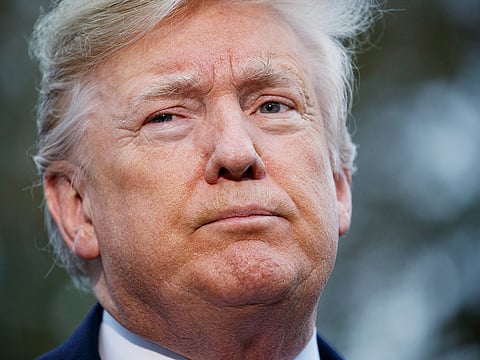America must uphold its moral authority
Country is both an inspiration and an ideal for other nations around the globe

True, the power that a superpower wields is immense. But we know by now that that immense power is not confined to diffusing shock and awe around the world, but extends to creating facts on the ground, including bogus “alternative facts”, whenever these are needed, and rendering them concrete ones.
In an article several months ago, Carlos Lozada, book editor of the Washington Post, recalled for his readers how in 2002, a senior adviser to President George W. Bush once berated a journalist for being part of a “reality-based community”.
The unnamed adviser then went on to explain to the incredulous hack that “seeking answers in reality” effectively is for dumb suckers, not big powers.
“We’re an empire now, and when we act, we create our own reality,” he said. In short, possessed of enough hubris as a global leader, in a unilateral world where you are the sole mover and shaker, events will bend to your will.
But that’s only the half of it. A dominant superpower diffuses not just hard power (getting people in other countries to do what it wants) but soft power as well (getting people to voluntarily do what it does). What comes to mind here is the pithy epigram about how when America sneezes, the world catches a cold. The moral of the story here is that where America stands on an issue has ripple effects that in time set the tone for the global dialogue of cultures. As a world leader other nations, if only willy-nilly, follow its lead.
When the US moved its embassy from Tel Aviv to Occupied Jerusalem on May 14, for example, Guatemala moved its own there two day later. Soon after that still, also in May, Paraguay announced that it would follow President Donald Trump’s lead by relocating its mission to the Holy City — only to reverse its decision three months later.
‘Eminence without honour’
Now Brazil’s far-right President-elect, Jair Bolsonaro, is promising that Brasilia will move the Latin American country’s embassy to Occupied Jerusalem, squarely aligning himself with Washington’s own controversial switch, at the same time bolstering his image as the “Tropical Trump”. He did, after all, leave many Brazilians outraged with derogatory comments about women, blacks and the media, and with provocative remarks about how he supported the torture of political prisoners during the 20-year reign, that began in 1964, of the country’s military regime. Next order of business? The delegitimisation of the status of diaspora Palestinians as refugees.
The message? The only way for a powerless people to avoid the predation of a big power, and equally avoid the robbery of their land and their water resources by one of its client states, is to keep their heads down and accept their fate.
But at the end of the day, the United States, like other superpowers before it, remains a polity imbued with a great many contradictions. And over the years, these contradictions have driven prominent American historians, such as John Meacham, Arthur Schlesinger, Doris Kearns Goodman, and most recently Joseph J. Ellis, in his just released American Dialogue: The Founders and Us, to ransack the attic of their history, as it were, for answers to the riddle of these contradictions — the riddle of how the Founding Fathers, including Thomas Jefferson (who was behind the fundamental principle in the Declaration of Independence that “all men are created equal”) went on to establish a slavery-based republic.
At the end of the day, the United States, like other superpowers before it, remains a polity imbued with a great many contradictions. And over the years, these contradictions have driven prominent American historians to ransack the attic of their history, as it were, for answers to the riddle of these contradictions.Fawaz Turki
The fact is that when America sneezes, we catch its contradictions as well, its ideas and ideology, its cinematic art and fashion statement, its rock music and stage musicals, its literary effusions and cultural life-style. Yet, ironically, the epigram about a big power sneezing and the rest of us catching a cold was not coined by, say, an ethnocentric American but by Klemens Mitternich (d. 1859), the Prussian Empire’s foreign minister, who used it to refer to France and the power that France wielded during the Napoleonic wars — a time when Prussia itself was a feared, at times brutal military power. (Don’t ask for directions on how to get there, for Prussia ceased to exist in 1932.)
“What has history said of eminence without honour, wealth without wisdom, power without principle?” Orson F. Whitney, the American social critic, poet and historian once asked rhetorically. “The answer is found in the overthrow of the mightiest empires of ancient time, Babylon, Persia, Greece, Rome, the four successive universal powers of the past. What and where are they?”
Wistful or mystical musing aside, everyone and everything in this world of ours has a lifespan. Men and empires, along with the ideas dear to them, are headed to that same terminus — forgotten dust — whence they will make room for other men, empires and ideas to become what they are destined by the Creator to be.
Fawaz Turki is a journalist, lecturer and author based in Washington. He is the author of The Disinherited: Journal of a Palestinian Exile.


